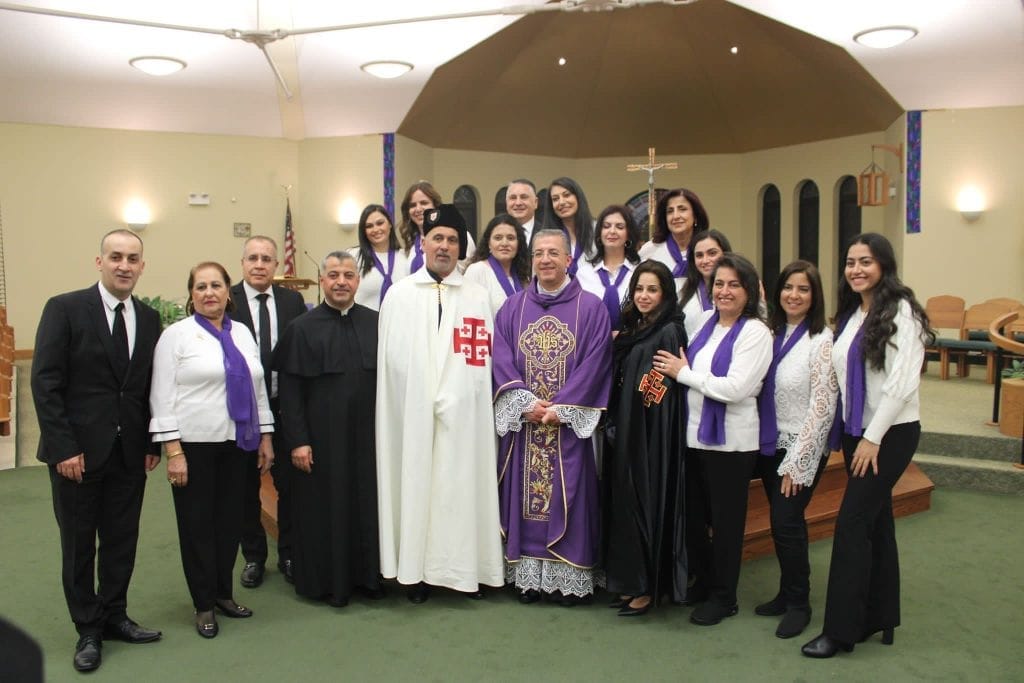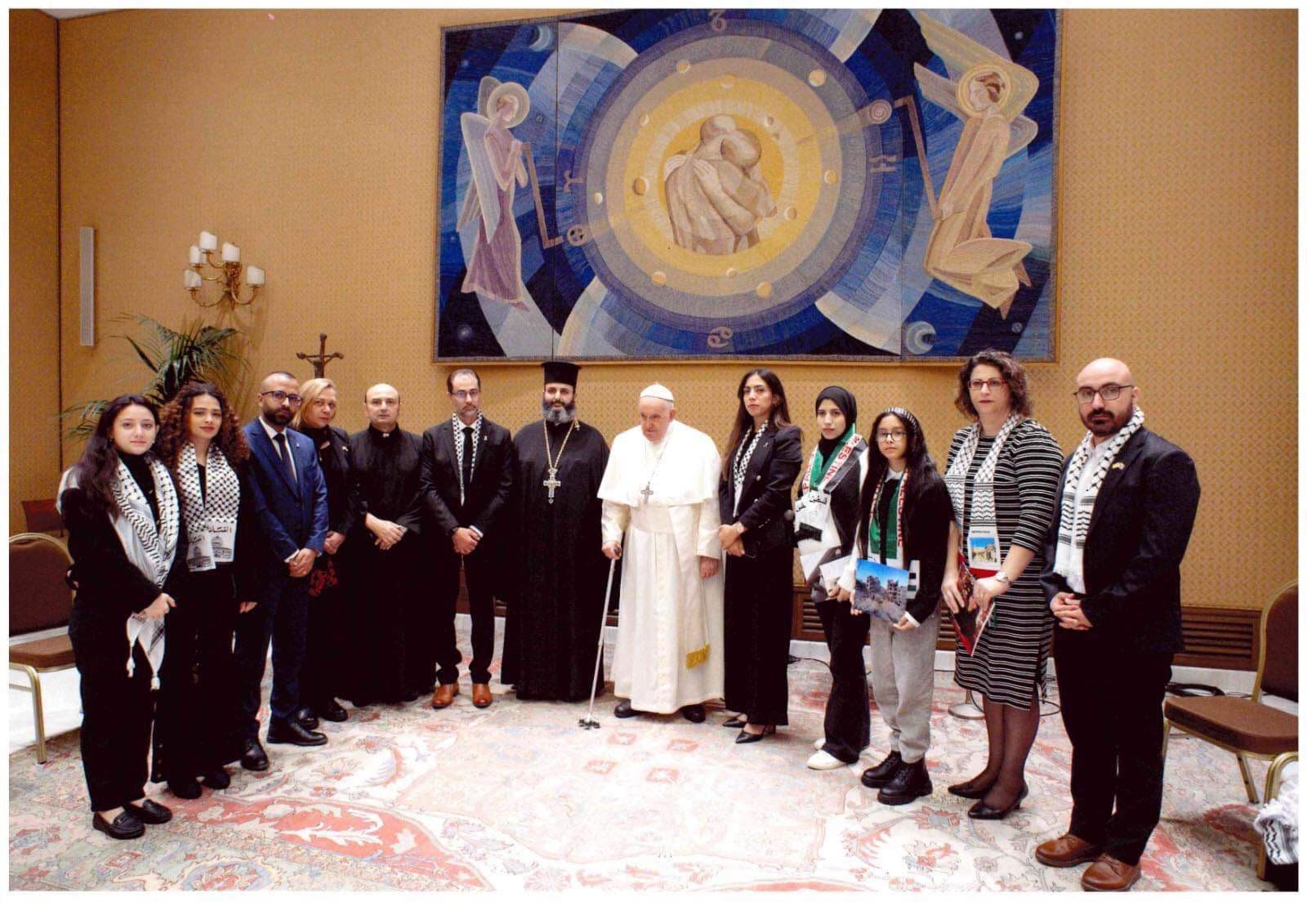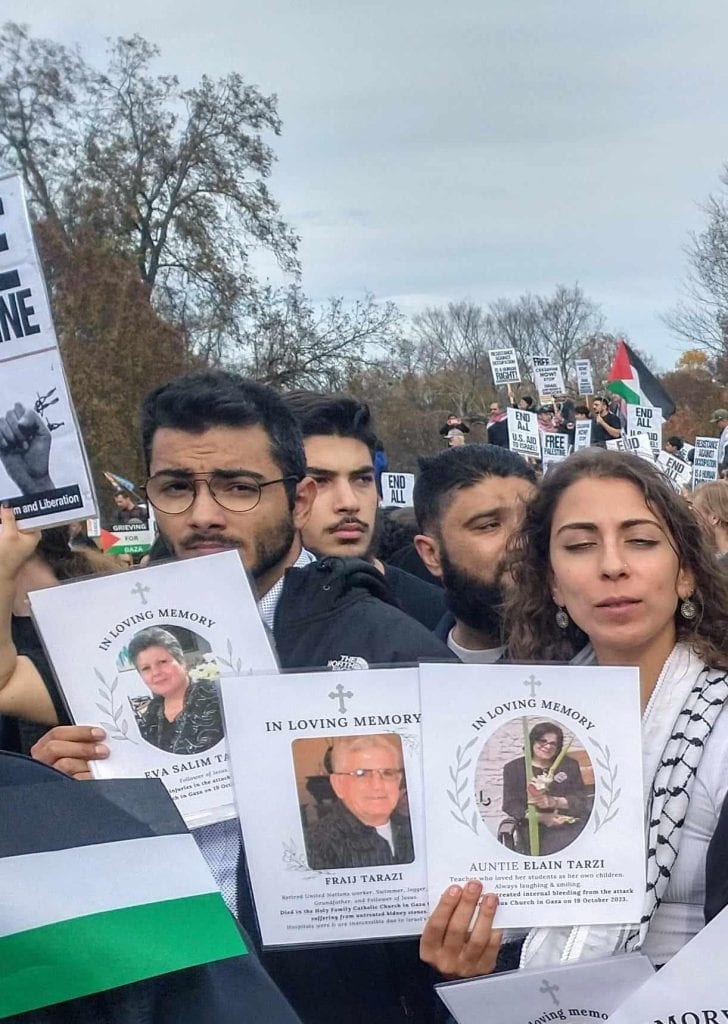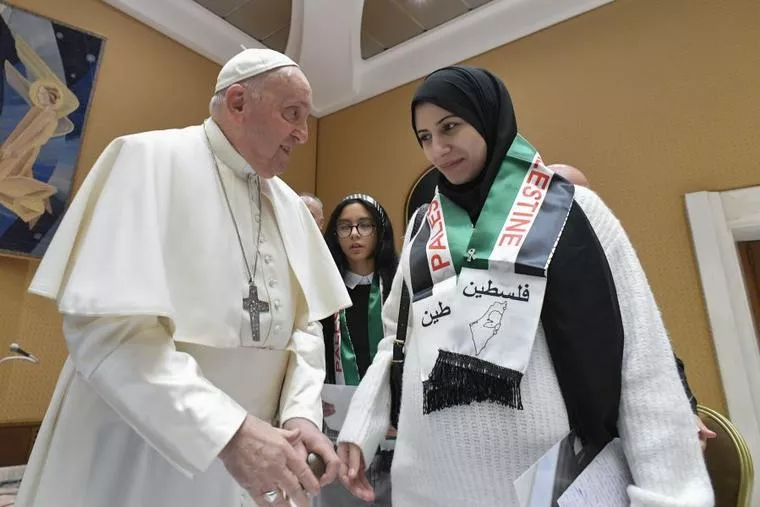
Previous Fr. Wissam Mansour new pastor for the Arabic-speaking faithful in Chicago

By Shireen Hilal Awwad
During the special audience, the Palestinian delegation had with Pope Francis on November 22nd each person had a story to tell. Here are some of those stories. All those who shared such stories had lost loved ones. I will start with my own:
· My mother comes from Gaza, from a well-known Christian family, called Tarazi. The Christian population has been in that area for many hundreds of years. One of the churches there is believed to be 1,300 years old. Her family is indigenous to Gaza – they did not come there after the 1948 war. Her name is Nuha. My mother had twelve siblings. Half live in Gaza, and the other half are scattered around the world. Those who stayed in Gaza have been in leadership positions in Gaza. Four of them were leaders of schools; one was a UN director; one was an accountant; two were doctors.

· My aunt, Elaine, who is in her seventies, had to go to the church for refuge when the war started in Gaza on 7th October – together with uncles and cousins. On 19th October, the Greek Orthodox Church was hit by a missile, and seventeen people were killed as a result. My aunt Elaine was one of those. She was severely injured in her hip. Elaine at first came out alive and was sent to the hospital. The hospital did not have the facilities to help her. She had internal bleeding and died a few hours later. My other aunt needed an operation, but the hospital had no anesthetic. After 24 hours of discussion, they had to do a hip replacement with no anesthesia. She is currently OK but still lacks basic needs. She is still in deep pain and cannot walk. Her spirits are very low. She has no hope. When someone is psychologically very low, they also become unwell physically. This is the case for most people in Gaza.
· As for my uncle, Freij – he took refuge in the Latin church. Families are separating like this so that everyone will not be together, and, in the event of a strike, they will not be killed at the same time. He died – not because of the bombing – but because of a lack of access to health facilities. He had appendicitis and the appendix burst. No surgery is done in the area due to the collapse of the health system.
· Mohammad and his wife Manar, who now live in Europe. Mohammad left Gaza during one of the wars and has only returned for visits. His entire family is still in Gaza. His family comprises his mother, father, brother, and sister, together with children and grandchildren. Mohammad was in contact with his family daily when there was a phone connection. One day he lost contact. On the second day, he heard nothing. Later, he was able to be in touch with his cousin – when he received the worst news. His worst nightmare came true – the whole of Mohammad’s family had been killed by a missile strike. None of them survived. Over twenty-five family members were killed. Can you imagine losing a mother – a father – a sister and a brother on the same day?
· His nieces and nephews were also lost. Such a catastrophe is one that many of the families in Gaza have experienced, and what they fear all the time. Many families have been wiped out.
· Another young girl, Farah Erekat, lost her brother, Ahmed, three years ago at an Israeli checkpoint. The soldiers suspected that he was there as a suicide bomber, or to attack the soldiers at the checkpoint. Later they learned that this 26-year-old young man crossed to this side of the street unintentionally – actually, he was preoccupied with trying to reach the neighbouring city, to decorate his sister’s wedding car. ‘Imagine losing a brother on your sister’s wedding day,’ Farah added. ‘My brother’s body is imprisoned even when dead. There are 365 bodies in Israel, and it has been three years now. In Islam, the Shahied needs to be buried, out of respect.’ She also added that they know where his body is. It is now at the Tel Aviv University Laboratory. Most of those killed in this way have their organs stolen. ‘There is no doubt that my brother is one of these.’ Again, this is the story of many families who live under occupation.
· Hadija is less than 25 years old. She is married to Maji. Maji left Gaza during the last war and became a refugee in Europe. He returned and married Hadija only last year. Both are expecting their first baby girl on 21st December. Hadija joined the delegation because she lost many of her cousins. While visiting the Vatican, Hadija constantly kept trying to call her family in Gaza, to make sure they were OK. We shared valuable moments when Hadija and Maji were trying to think of a name for their daughter. They could not decide between ‘Ward’ or ‘Mia.’ During the visit with His Holiness Pope Francis, the Pope laid his hands on Hadija’s stomach, and Hadija asked him to pray for her child, and all the children of Gaza.
· On the 5th of December, Hadija received the most awful news, that her whole family had been killed in Gaza. We are at a loss for words. What do we say to a young mother-to-be who, despite the awful war, was looking forward to a better future? She is looking forward to the birth of her child and had hoped that her mother would be there with her during the birth. Now, no family will see the baby. Instead of a happy ending with a new baby, the house is one of mourning and deep sorrow. She is bearing this deep sorrow, instead of the joy she should be feeling at this time.

· A young Bedouin girl, Sajar, who is living in Belgium. She is 13 years old. She visited friends and family in Gaza. Now, with the bombardment and devastation, everything is different. Sajar has lost around sixty people from her community in Gaza – close friends (those she went to school with) and cousins. She saw them last year when things were OK. Now they are gone. Sajar used the word ‘genocide’ when speaking to the Pope.


تكافح مجلة “ملح الأرض” من أجل الاستمرار في نشر تقارير تعرض أحوال المسيحيين العرب في الأردن وفلسطين ومناطق الجليل، ونحرص على تقديم مواضيع تزوّد قراءنا بمعلومات مفيدة لهم ، بالاعتماد على مصادر موثوقة، كما تركّز معظم اهتمامها على البحث عن التحديات التي تواجه المكون المسيحي في بلادنا، لنبقى كما نحن دائماً صوت مسيحي وطني حر يحترم رجال الدين وكنائسنا ولكن يرفض احتكار الحقيقة ويبحث عنها تماشيًا مع قول السيد المسيح و تعرفون الحق والحق يحرركم
من مبادئنا حرية التعبير للعلمانيين بصورة تكميلية لرأي الإكليروس الذي نحترمه. كما نؤيد بدون خجل الدعوة الكتابية للمساواة في أمور هامة مثل الإرث للمسيحيين وأهمية التوعية وتقديم النصح للمقبلين على الزواج وندعم العمل الاجتماعي ونشطاء المجتمع المدني المسيحيين و نحاول أن نسلط الضوء على قصص النجاح غير ناسيين من هم بحاجة للمساعدة الإنسانية والصحية والنفسية وغيرها.
والسبيل الوحيد للخروج من هذا الوضع هو بالتواصل والنقاش الحر، حول هويّاتنا وحول التغييرات التي نريدها في مجتمعاتنا، من أجل أن نفهم بشكل أفضل القوى التي تؤثّر في مجتمعاتنا،.
تستمر ملح الأرض في تشكيل مساحة افتراضية تُطرح فيها الأفكار بحرّية لتشكل ملاذاً مؤقتاً لنا بينما تبقى المساحات الحقيقية في ساحاتنا وشوارعنا بعيدة المنال.
كل مساهماتكم تُدفع لكتّابنا، وهم شباب وشابات يتحدّون المخاطر ليرووا قصصنا.